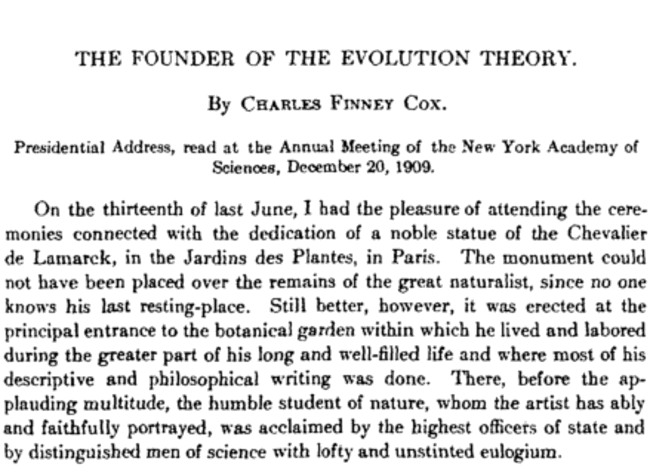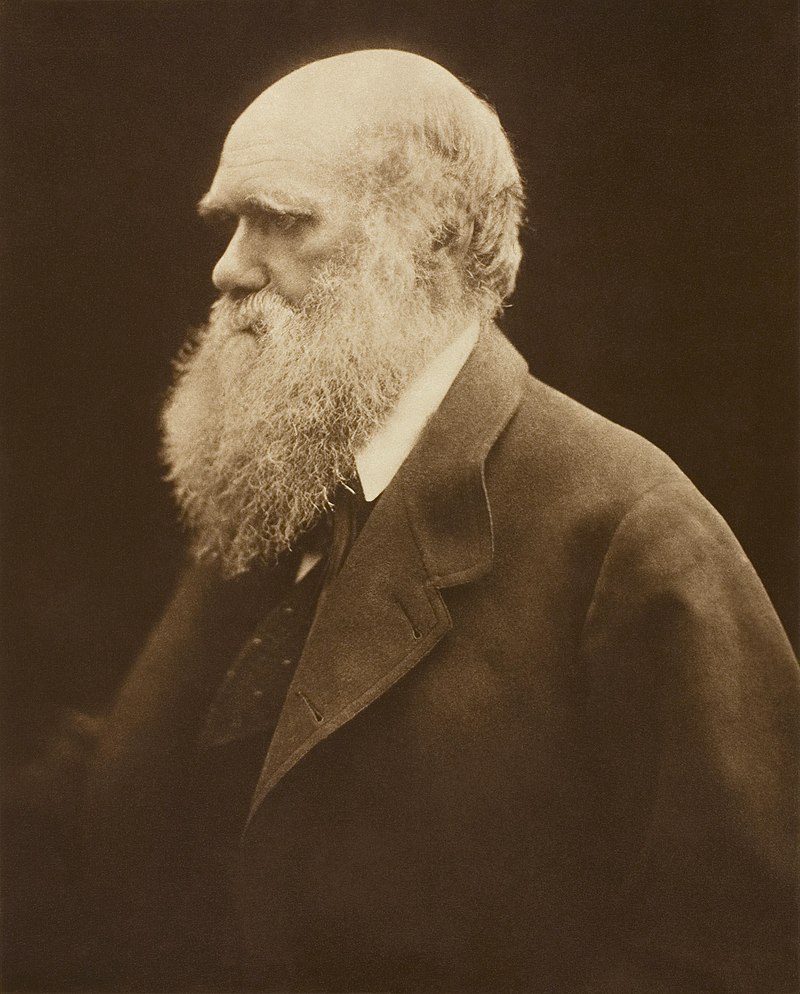From the Annals Archive: How Darwin Upended the World
From the archive of Annals of the New York Academy of Sciences, the 1909 address of Academy President Charles Finney Cox recalls the chilly reception to Darwin’s Origin of Species 50 years earlier.
Published March 1, 2009
Adapted from works by Charles Finney Cox
Academy President (1908-1909)

… It was only when The Origin appeared, in November 1859, that the world awaked to a realization of the fact that the evolution theory had to be reckoned with, and the scientific part of the world aroused itself no more quickly than the rest. August Weismann says, “We who were then the younger men, studying in the fifties, had no idea that a theory of evolution had ever been put forward, for no one spoke of it to us, and it was never mentioned in a lecture.”
He also declares that “Darwin’s book fell like a bolt from the blue; it was eagerly devoured, and while it excited in the minds of the younger students delight and enthusiasm, it aroused among the older naturalists anything from cool aversion to violent opposition.” [1]
Darwin knew that when he should publish his denial of the separate and definitive creation of each particular species, he would have to face a nearly unanimous adverse judgment, among the learned and the unlearned alike.
His feeling in this matter was shown by his half-humorous remark, when announcing to Joseph Hooker, in 1844, his conviction as to the transformation of species, that he felt as if he were confessing to a murder! … It is indicated also by his writing to Asa Gray, in 1856, “As an honest man I must tell you that I have come to the heterodox conclusion that there are no such things as independently created species, that species are only strongly defined varieties. I know this will make you despise me.” [2]
Darwin’s Challengers
Darwin underestimated Gray’s preparedness to receive the new doctrine, but he showed that he did not expect a respectful hearing for his novel ideas by men of science generally, and in this unfavorable prognostication he proved to be right. Hooker, Gray, and Wallace were his only staunch allies at first; Huxley joined the little band soon after the opening of the war, although he never gladdened Darwin’s heart by unreservedly accepting natural selection.

Lyell, of all Darwin’s personal friends, gave him the greatest grief by his hesitation, especially because he seemed in private more favorable than he was willing to appear in public. Worst of all, he confessed to Huxley that he was held back more by his feelings than by his judgment. His final surrender was made in the tenth edition of his Principles of Geology, published in 1869.
For fully 10 years then, Darwin was obliged to plead with his scientific acquaintances to come even a little way with him, assuring them that if they would only admit the mutability of species, he would not urge them to go the length of accepting natural selection, thus proving that the scientific world had by no means been led up to a recognition of the fact of transmutation, much less to the reception of any particular theory of its causation.
Even as late as 1880 we find Huxley apologizing to Darwin for having slighted or ignored natural selection in his lecture, The Coming of Age of the Origin of Species, because, as he argued, it was still essential “to drive the fact of evolution into people’s heads” leaving the exposition of its cause, or modus operandi, to come later.
“Germany took time to consider”
But English men of science were not alone in their reluctance to adopt the evolution theory. As Huxley said, “Germany took time to consider.” Bronn produced a poor translation of The Origin in 1860, but omitted from it, out of deference to popular opinion, numerous supposedly offensive passages (as, for example, the sentence near the end concerning the light likely to be thrown upon the origin of man) and added a critical appendix intended to expose Darwin’s weak points and to soften the effect of some of his scientific heresies.
Although Ernst Krause attributes considerable influence to Häckel’s advocacy of evolution in his Radiolaria published in 1862, he says it was really in 1863, when Häckel championed the cause at the “Versammlung” of naturalists at Stettin, that the Darwinian question could be considered as having been placed “for the first time publicly before the forum of German science.” In France, according to Huxley, the ill-will of powerful members of the Institute “produced for a long time the effect of a conspiracy of silence,” and it was only in 1869 that Hooker was able to say, “the evolution of species must at last be spreading in France.”
Looking at the whole situation a year after the publication of The Origin, Huxley says that the supporters of Mr. Darwin’s views were numerically extremely insignificant and that “there is not the slightest doubt that, if a general council of the Church scientific had been held at that time, we should have been condemned by an overwhelming majority.” [3]
Works Cited
1. The Evolution Theory.” Thomson’s translation, p. 28. 1904
2. “Life and Letters of Charles Darwin.” Vol. 11, p. 79. 1887.
3. On the reception of Origin of Species in “Life and Letters of Charles Darwin.” Vol. 11, p. 186. 1887.
Charles Finney Cox (1846-1912), served as Academy President in 1908 and 1909. A life-long collector of Darwiniana, Cox amassed a nearly complete collection of the great naturalist’s books, papers, photographs, drawings, and other artifacts. This essay is excerpted from his address to the Academy’s Annual Meeting, December 20, 1909. Read more from the Annals of the New York Academy of Sciences archive.
